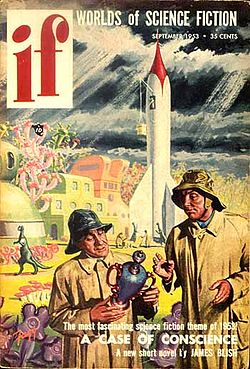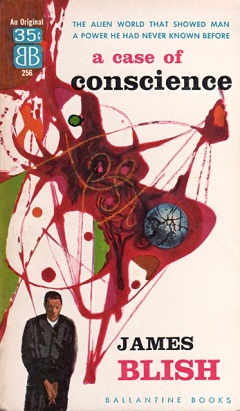Part 1
In 2049, Father Ramon Ruiz-Sanchez of Peru, Clerk Regular of the Society of Jesus, is a member of a four-man team of scientists sent to the planet Lithia to determine if it can be opened to human contact. Ruiz-Sanchez is a biologist and biochemist, and he serves as the team doctor. However, as a Jesuit, he has religious concerns as well. The planet is inhabited by a race of intelligent bipedal reptile-like creatures, the Lithians. Ruiz-Sanchez has learned to speak their language to learn about them.
While on a walking survey of the land, Cleaver, a physicist, is poisoned by a plant, despite a protective suit, and he suffers badly. Ruiz-Sanchez treats him and leaves to send a message to the others: Michelis, a chemist, and Agronski, a geologist. He is helped by Chtexa, a Lithian whom he has befriended, who then invites him to his house. This is an opportunity which Ruiz-Sanchez cannot decline; no member of the team has been invited into Lithian living places before. The Lithians seem to have an ideal society, a utopia without crime, conflict, ignorance or want. Ruiz-Sanchez is awed.
When the team is reassembled, they compare their observations of the Lithians. Soon they will have to officially pronounce their verdict. Michelis is open-minded and sympathetic to the Lithians. He has learned their language and some of their customs. Agronski is more insular in his outlook, but he sees no reason to consider the planet dangerous. When Cleaver revives, he reveals that he wants the place exploited, regardless of the Lithians' wishes. He has found enough pegmatite (a source of lithium, which is rare on Earth) that a factory could be set up to supply Earth with lithium deuteride for nuclear weapons. Michelis is for open trade. Agronski is indifferent.
Ruiz-Sanchez makes a major declaration: he wants maximum quarantine. The information Chtexa revealed to him, added to what he already knew, convinces him that Lithia is nothing less than the work of Satan, a place deliberately constructed to show peace, logic, and understanding in the complete absence of God. Point for point, Ruiz-Sanchez lists the facts about Lithia that directly attack Catholic teaching. Michelis is mystified, but does point out that all the Lithian science he has learned, while perfectly logical, rests on highly questionable assumptions. It is as if it just came from nowhere.
The team can come to no agreement. Ruiz-Sanchez concludes that Cleaver's intentions will probably prevail and Lithian society will be exterminated. Despite his conclusions about the planet, he has a deep affection for the Lithians.
As the humans board their ship to leave, Chtexa gives Ruiz-Sanchez a gift—a sealed jar containing an egg. It is a son of Chtexa, to be raised on Earth and learn the ways of humans. At this point, the Jesuit solves a riddle which he has been pondering for some time, from Book III of Finnegans Wake by James Joyce (pp. 572–3), which proposes a complex case of marital morals, ending with the question "Has he hegemony and shall she submit?" To the Church, neither "Yes" nor "No" is a morally satisfactory answer. Ruiz-Sanchez sees that it is two questions, despite the omission of a comma between the two, so that the answer can be "Yes and No".
Part 2
The egg hatches and grows into the individual Egtverchi. Like all Lithians, he inherits knowledge from his father through his DNA. Earth society is based on the nuclear shelters of the 20th century, with most people living underground. Egtverchi is the proverbial firecracker in an anthill; he upends society and precipitates violence.
Ruiz-Sanchez has to go to Rome to face judgment. His conviction about Lithia is viewed as heresy, since he believes Satan has the power to create a planet. This is close to Manichaeism. He has an audience with the Pope himself to explain his beliefs. Pope Hadrian VIII, a logically and technologically aware Norwegian, points out two things Ruiz-Sanchez missed. First, Lithia could have been a deception, not a creation. And second, Ruiz-Sanchez could have done something about it, namely, perform an exorcism on the whole planet. The priest bows his head in shame that he has overlooked an obvious solution to his own case of conscience while he was absorbed in "a book [Finnegans Wake] which to all intents and purposes might have been dictated by the Adversary himself ... 628 pages of compulsive demoniac chatter." The Pope dismisses Ruiz-Sanchez to purge his own soul and to return to the Church if and when he can.
A violent mass riot breaks out, fomented by Egtverchi and made possible by the psychosis present in many of the citizens as a result of living in the 'shelter state' (an earlier reference to the "Corridor Riots of 1993" indicates that this is not the first time violence has burst out among the buried cities). During the riot, Agronski dies as a result of being stung by one or more genetically modified honey bees. Ruiz-Sanchez administers Extreme Unction, despite his almost-faithless state. Egtverchi secretly boards a spaceship to Lithia. Michelis and Ruiz-Sanchez are taken to the Moon, where a new telescope has been assembled, based on "a fundamental twist on the Haertel equations which makes it possible to see around normal space-time, as well as travel around it" [1] so that the instrument presents a view of Lithia in real time, bypassing the delay caused by the speed of light. Cleaver is on Lithia, setting up his reactors, but the physicist who invented the telescope technology believes he has found a fault in Cleaver's reasoning. There is a chance that the work will set off a chain reaction in the planet's rocks and destroy it.
As they watch on the screen, Ruiz-Sanchez pronounces an exorcism. The planet explodes, eliminating Cleaver and Egtverchi, but also Chtexa and all the things Ruiz-Sanchez admired. It is left ambiguous whether the extinction of the Lithians is a result of Ruiz-Sanchez's prayer or Cleaver's error.

